It’s a tough time for bullies. First, with all the social sensitivities of our era, there has been ostracization and shame. Then came the logistical difficulties of social distancing. You try delivering a swirly or a headlock from six feet away! It’s given us a break in which to reexamine the historical importance of the bully, even look at him with renewed appreciation.
Take, for example, Johnny Lawrence, the blond-haired heavy of the original The Karate Kid. He is middle-aged in Cobra Kai, a sequel that premiered on YouTube and was picked up by Netflix, where it’s been the number one show—at least partly because Cobra Kai reveals Johnny Lawrence as not just a superannuated figure of menace but, in the way of a Lermontov protagonist, a hero of our time.
Netflix’s trailer cuts straight from the penultimate Karate Kid scene—Daniel LaRusso (Ralph Macchio) delivering the ostentatious crane kick that vanquished the bully—to present-day San Fernando Valley, where, 34 years on, Johnny, having never really gotten up off the mat, wakes on the floor of his rented Reseda apartment amid the spent beer cans of a wasted life. But the gods are not done with Johnny, who, as worn as an old steel-toed boot, is called on to rescue, and then teach, a high school pincushion (Xolo Mariduena) Cobra Kai’s version of karate (“Strike first, strike hard”). In other words, the script is flipped, with Johnny becoming a Sensei.
Old Flogs, New Tricks
What sort of geniuses came up with this pop dream, in which Johnny, who made us fear blonde haired bullies as much as any Van Patten, becomes Miyagi, while Daniel (Macchio), having grown soft with wealth—he owns car dealerships and has his face on billboards—floats blissfully across a Tom Petty sky? William Zabka’s aging Johnny, who ranks with Robert De Niro’s old LaMotta for pathos, stands for all those members of Gen X squeezed between the Boomers and the Millennials, as disengaged as Bogart at the start of Casablanca, wanting only to be left alone with our Guns N’ Roses and Coors.
The Karate Kid was based on a true story. Hollywood producer Jerry Weintraub spotted it among the detritus of the evening news. “This fat kid was getting bullied in the Valley, so he learned karate and kicked their ass,” Weintraub said years later. “I got the kid out here the next day, had him sign some papers, and we’re off!” The Karate Kid grossed nearly $100 million in the summer of 1984, becoming hallowed in the way of Rocky. When asked why he made or allowed so many sequels—there have been six Karate Kid movies as of 2018—Weintraub thought a moment, then said, “Don’t be a schmuck.”
Cobra Kai reveals Johnny Lawrence as not just a superannuated figure of menace but, in the way of a Lermontov protagonist, a hero of our time.
None of the sequels approached the power, spiritual or commercial, of the original. It would in fact take a new medium—streaming television —and a new vision to recover the old magic. Cobra Kai pays homage to the original, while undoing it.
Gregory Maguire’s novel Wicked recast The Wizard of Oz from the witch’s point of view. Cobra Kai does the same, only instead of Dorothy it’s Daniel Son and instead of the Wicked Witch its Johnny Lawrence, who, as it turns out, has his own version of events. Did it ever occur to Daniel LaRusso that he was entering an existing social construct when he wandered down to the beach to play soccer that fateful night? Or that Ali Mills (Elisabeth Shue) already had a boyfriend? Or that a sucker punch is a sucker punch even if you believe your cause is just? Or that Johnny had problems of his own?
The creators (Jon Hurwitz, Hayden Schlossberg, and Josh Heald) did not change Johnny’s inner nature. He remains a bully, and still feels the need to call a nerd a nerd. But we are made to recognize the playground thug as a helpful part of the natural ecosystem, the predator that prepares the fledglings. Otherwise, how will you learn to defeat more serious bullies in the real world? Let’s say, in a nation cleansed of playground leviathans, a bully showed up on a presidential ballot.
Imagine what would happen then?
Rich Cohen is an Editor at Large for Air Mail

